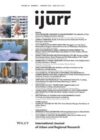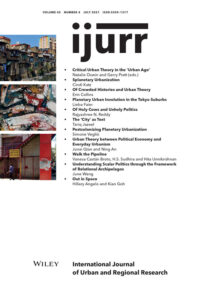Volume 45 Issue 4 July 2021
In This Issue...
The introduction of the ‘planetary urbanization’ thesis has flared a plethora of debates among scholars in recent years. The July issue of IJURR includes a symposium and a set of papers that continue engaging with these debates. Drawing on both empirical and archival research that examines urbanizing processes at a diverse range of sites spreading across Asia and the Americas, the authors present their own perspectives on what it means to understand the planetary unfolding of the urbanizing world, and how to interpret the microcosm of everyday life and struggles against the backdrop of capitalist urbanization that is uneven and heterogeneous across time and space.
The first set of papers constitute a symposium guest-edited by Natalie Oswin and Geraldine Pratt, which engages with planetary urbanization in a way that emphasizes the significance of ground-up theorization of urbanizing processes at multiple scales. Cindi Katz examines three texts to shed light on some of the social relations that she considers to be less visible in the existing narratives of planetary urbanization. By examining Cambodia’s land politics in particular, Erin Collins proposes the concept of heterotemporality, emphasizing how differential forms of uneven processes of urbanization produce lived experiences among subjects, which cannot be flattened as a singular temporality. For Collins, such heterotemporality is pivotal for urban struggles to claim alternative urban futures. Based on ethnographic and documentary research carried out in both Japan and the Philippines, Lieba Faier provides an illuminating account of how Filipina migrant workers have become subject to labor exploitation, caught in between what Faier refers to as “two discrepant processes of urbanization”. Rajyashree N. Reddy shifts our attention to urbanizing India where the analysis of its Dalit struggles brings to the fore the importance of ‘planetarity’, emphasizing the role played by embedded casteism and racism in the production of urban ecologies. The final paper of the symposium is a commentary by Tariq Jazeel, whose postcolonial perspectives guide readers to the question of ‘what is the city’, suggesting how the city can also be read as ‘a text’ that incorporates the lessons from area and regional studies to help overcome the limits of extant urban studies.
Two of the articles and an intervention that follow the symposium are expected to further enrich the planetary urbanization debates by providing a historical perspective on the one hand, and by presenting a possibility of reconciling the critical political economic approaches with everyday urbanism on the other. The piece by Simone Vegliò decentres the debates on planetary urbanization by providing an alternative genealogy of critical scholarship that is based on the work of Aníbal Quijano, a Peruvian sociologist. This raises the importance of engaging with the scholarly tradition located elsewhere. Through a theoretically informed literary critique of a Chinese novel that unveils a story of a rural village becoming urban, Junxi Qian and Ning An aim to address the epistemological gap between the political economic and everyday urbanism approaches. Such a call for reconciliation is also evident in the Intervention piece by Hillary Angelo and Kian Goh, whose critique as queer, feminist scholars argues that it is possible for the planetary urbanization framework to pay attention to locally-embedded “social differences at the level of everyday life”, a view towards which the contributors to the symposium appear to show less inclination.
The remaining two papers in this issue guide readers through everyday urban politics of urbanization. In their discussion of pipeline as urban infrastructure in India, Vanesa Castán Broto, H.S. Sudhira and Hita Unnikrishnan demonstrate how their methodological innovation to “walk the pipeline” allows them to understand urban infrastructural landscapes as the material manifestation of multiple urban imaginaries that work in tandem to produce the Indian city as well as an array of everyday practices embedded in the urban fabric. June Wang, on the other hand, examines the experience of the International Cultural Industrial Fair in Shenzhen to discuss the territorial and capitalist logics of making China’s state space that builds on hierarchical and network systems of governance, which is behind the facilitation of rapid urbanization China has experienced.
Put together, all these articles in the July issue of IJURR help us continue our endeavor to understand the inherent contradictions of (capitalist) urbanization processes that work at multiple geographical scales such as the body, family, community, city, nation and beyond, compelling us to ponder about the complexities of planetary struggles for alternative and progressive urban futures.
— Hyun Bang Shin
Symposium
Critical Urban Theory in the ‘Urban Age’: Ruptures, Tensions, and Messy Solidarities
Published online on Jul 29th, 2021 | DOI: 10.1111/1468-2427.13023 (p 585-596)
Splanetary Urbanization
Published online on Jul 29th, 2021 | DOI: 10.1111/1468-2427.13025 (p 597-611)
Of Crowded Histories And Urban Theory: A Feminist Critique of Temporal Closure and Patrimonial Claims to the Urban
Published online on Jul 29th, 2021 | DOI: 10.1111/1468-2427.13026 (p 612-629)
Planetary Urban Involution in the Tokyo Suburbs
Published online on Jul 29th, 2021 | DOI: 10.1111/1468-2427.13027 (p 630-642)
Of Holy Cows And Unholy Politics: Dalits, Annihilation and More-than-Human Urban Abolition Ecologies
Published online on Jul 29th, 2021 | DOI: 10.1111/1468-2427.13028 (p 643-657)
The ‘City’ as Text
Published online on Jul 29th, 2021 | DOI: 10.1111/1468-2427.13029 (p 658-662)
Articles
Postcolonizing Planetary Urbanization: Aníbal Quijano and an Alternative Genealogy of the Urban
Published online on Jun 30th, 2021 | DOI: 10.1111/1468-2427.13024 (p 663-768)
Urban Theory Between Political Economy and Everyday Urbanism: Desiring Machine and Power in a Saga of Urbanization
Published online on Jan 5th, 2021 | DOI: 10.1111/1468-2427.12988 (p 679-695)
Walk the Pipeline: Urban Infrastructure Landscapes in Bengaluru’s Long Twentieth Century
Published online on Feb 8th, 2021 | DOI: 10.1111/1468-2427.12985 (p 696-715)
Understanding Scalar Politics Through the Framework of Relational Archipelagos: The Case of Shenzhen Fair, China
Published online on Feb 16th, 2021 | DOI: 10.1111/1468-2427.12989 (p 716-731)
Interventions
Out in Space: Difference and Abstraction in Planetary Urbanization
Published online on May 12th, 2020 | DOI: 10.1111/1468-2427.12911 (p 732-744)
Book Reviews
Davide Ponzini 2020: Transnational Architecture and Urbanism: Rethinking How Cities Plan, Transform, and Learn. Abingdon: Routledge
Published online on Jul 29th, 2021 | DOI: 10.1111/1468-2427.13047 (p 745-746)
Lisa B.W. Drummond and Douglas Young (eds.) 2020: Socialist and Post-Socialist Urbanisms: Critical Reflections from a Global Perspective. Toronto: University of Toronto Press
Published online on Jul 29th, 2021 | DOI: 10.1111/1468-2427.13048 (p 747-748)
Xuefei Ren 2020: Governing the Urban in China and India: Land Grabs, Slum Clearance and the War on Air Pollution. Princeton, NJ: Princeton University Press
Published online on Jul 29th, 2021 | DOI: 10.1111/1468-2427.13049 (p 748-750)
Martin J. Murray 2020: Panic City: Crime and the Fear Industries in Johannesburg. Stanford, CA: Stanford University Press
Published online on Jul 29th, 2021 | DOI: 10.1111/1468-2427.13050 (p 750-751)
Chris Harker 2020: Spacing Debt: Obligations, Violence, and Endurance in Ramallah, Palestine. Durham, NC: Duke University Pressxs
Published online on Jul 29th, 2021 | DOI: 10.1111/1468-2427.13051 (p 751-753)
Issues in this volume
July 2021
September 2021
November 2021
March 2021
May 2021
January 2021

